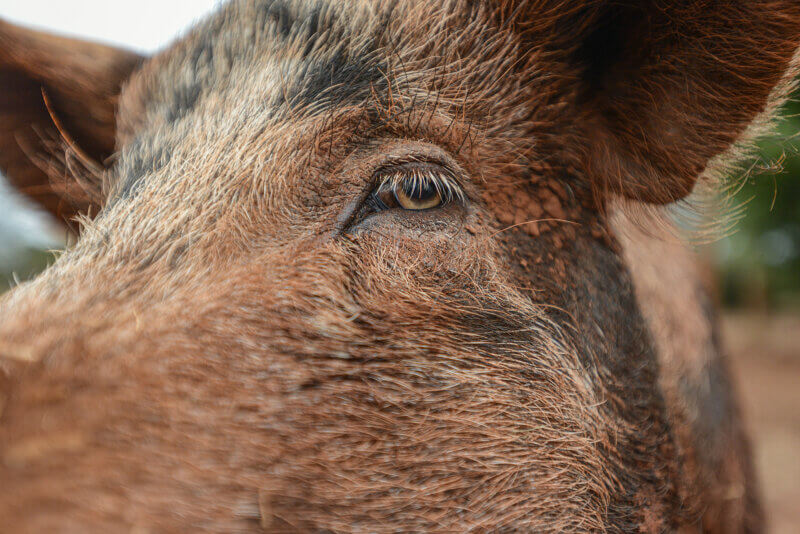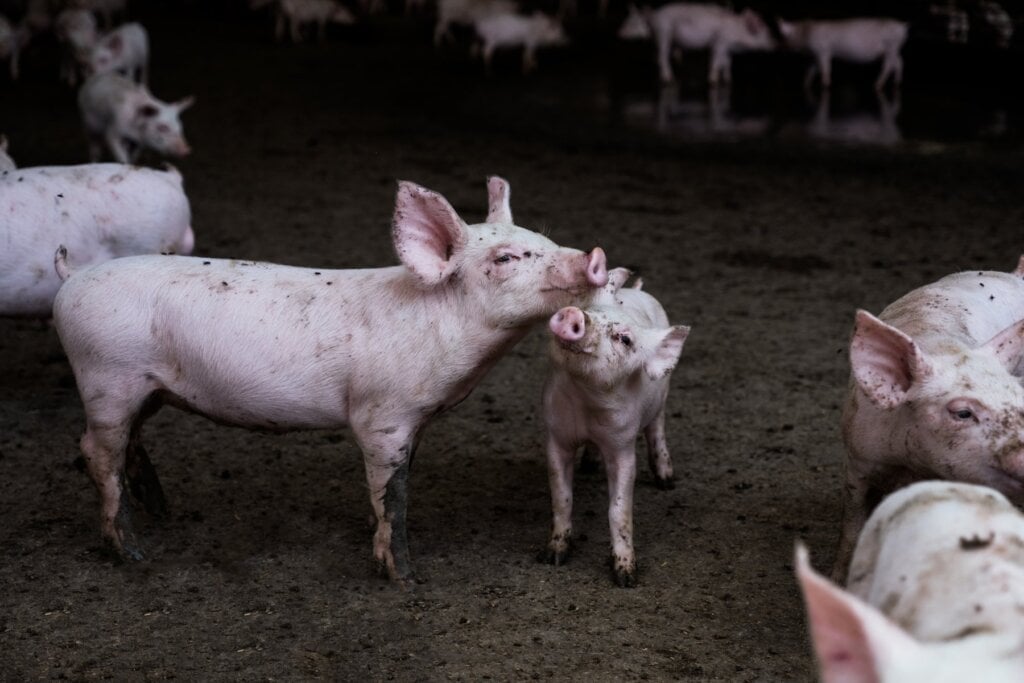Inquiry Into Pig Welfare in Victoria – Make Your Voice Heard
This action is now closed.
***
As the 12 January deadline for public submissions to Victoria’s pig welfare inquiry looms, please have your say by urging state leaders to take steps towards improving welfare and moving away from meat.
As PETA’s mission statement says – and as the world is increasingly realising – animals are not ours to use for food. Our aim is to end the breeding and slaughter of animals by humans. Just like humans and other animals, pigs experience pain and suffering. They are sentient beings with thoughts, feelings, and individual personalities, and they want to play and be with family and friends. They don’t voluntarily go to their deaths but struggle, scream, and try to escape. What’s done to them in the Australian pork industry in Victoria and elsewhere is a disgrace. The entire system should be shut down without delay – if dogs were being caged, bludgeoned, and gassed, it already would have been.
While the world shifts to vegan eating to protect sentient beings, the environment, and human health, taking steps towards improved welfare is the bare minimum that industry should do. PETA is urging the state government to immediately prepare and introduce legislation that at least provides for the following:
- Increased space and enrichment in pigs’ living areas to allow them to display more natural behaviour, such as rooting and foraging, as well as a swift and complete elimination of sow stalls and farrowing crates
- The cessation of tail docking and teeth clipping and the mandatory administration of pain relief during any cruel procedures that aren’t ended
- The elimination of carbon dioxide gassing and a commitment to researching alternative stunning methods
While the public is asked to submit comments on welfare reform, compassionate people can use the opportunity to stress that animals are not commodities but thinking, feeling fellow living beings who should not be killed for food. Such abuse is allowed only because of prejudice, like that which has previously blinded society to cruelty to and the exploitation of other humans. Victoria prides itself on being the nation’s most progressive state and therefore should be leading Australia away from animal agriculture entirely.
PETA’s Comments on the State of Animal Welfare Within Victorian Piggeries
Pigs are curious, clever, and sensitive individuals who have complex social, emotional, and cognitive skills. They are communicative and vocal, using more than 20 different sounds in various circumstances, including to display positive and negative emotions. Pigs also demonstrate empathy for others and have distinct personalities. And just as humans do, they value their lives.
What pigs endure in the Australian pork industry is an abomination. From their miserable birth in cramped crates, where their mother can’t even reach them to properly form the bonds that are so vital to pigs’ well-being, they suffer from intense confinement, mutilation, and abuse. They endure long, arduous journeys aboard trucks bound for an abattoir, during which they’re denied food and water – even in Australia’s scorching summer – and on arrival, they’re forced to smell the fear and hear the screams of other pigs being slaughtered. They panic and suffocate inside gas chambers before their throats are slit and their bodies are cut apart.
The only fair outcome of any industry review for these intelligent individuals would be the swift abolition of the practice of killing pigs for their flesh and a nationwide transition to plant-based farming. In the meantime, recommendations that emerge from a state-based welfare review obviously must prioritise reducing animal suffering, not pandering to economic concerns, and should focus on substantive improvements enshrined in law. As the animal agriculture industry has demonstrated, when such measures are voluntary and self-regulated, operators ignore them.
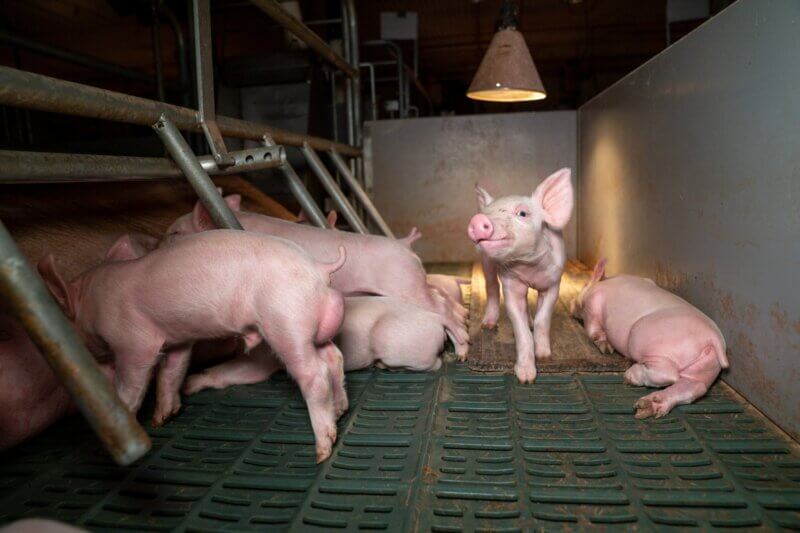
Confinement
Pigs have a natural need to root in the soil – unconfined pigs spend as much as 70% of their day foraging – but 90% of pigs bred for their flesh in Australia are raised indoors on filthy factory farms. There, feeding is automated and unvaried, even though these animals have naturally diverse diets. All elements of indoor intensive farming deny pigs almost everything that’s natural and important to them, leading to frustration, and farmed pigs routinely show signs of zoochosis, a form of psychosis that develops in animals held captive, such as biting the bars of sow stalls and other abnormal behaviour.
Victoria’s Pig Welfare Standards recommend that females who are yet to be bred (called “gilts”) in group housing be given a mere 1 square metre of space each and that sows in group housing be allowed just 1.4 square metres. This confinement is abjectly cruel.
The Australian pork industry committed to ending the use of farrowing crates and sow stalls by 2017. However, not all operations have done so, and pigs still suffer today in such inhumane housing systems. In Victoria, the legal requirement for a sow kept in a sow stall is a floor space of 0.6 metres wide and 2.2 metres long. Barely able to move under such conditions, let alone exercise, sows trapped in stalls lose physical conditioning, making it difficult for them even to stand up.
Farrowing crates – short and narrow metal cages to which pregnant sows are confined for giving birth and nursing their young – are also grossly inhumane. Mothers are forced to spend around six weeks in these structures, where the legally accepted space is just 0.5 by 2 metres, which is inadequate space for turning around or interacting with newborns. It’s like trapping a pregnant human inside a phone booth to deliver her newborn and nurse them there for weeks. It’s entirely unacceptable by any humane standard.
The barren environment that factory farmers force pigs to endure, combined with the lack of space, increases the risk that animals will exhibit unnatural behaviour towards other animals – as is also seen with human prisoners – such as taking out their frustrations and stress on each other. As discussed in more detail below, this issue is dealt with cruelly by inflicting painful mutilations to prevent pigs from injuring each other, which further compounds welfare issues.
High-density housing not only distresses these clever individuals but also increases the risk of animal-borne illnesses that infect pigs as well as humans. Japanese encephalitis was detected in pigs and humans in Victoria in 2022, spread via mosquito bites. The Department of Health and Aged Care reported that there were 44,403 confirmed cases of swine flu (H1N1) in Australia during the declared pandemic of 2009 and 2010.
Increasing space requirements and enriching pigs’ space to at least somewhat mimic nature and allow some basic behavioural expression would be small concessions to animals who are as intelligent and sensitive as the dogs with whom many Victorians share their homes. Disgraceful sow stalls and farrowing crates must be eliminated entirely. The industry must, at a minimum, increase space to decrease the frustration pigs endure, which would also, in turn, allow it to eliminate some elective mutilations and help Victoria achieve its biosecurity goals.
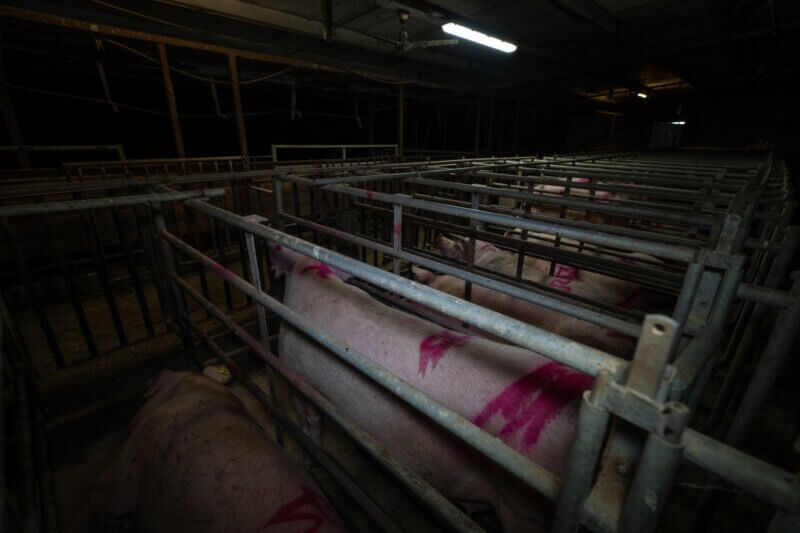
Mutilations
To identify animals, make their flesh more palatable to humans who enjoy eating it, and attempt to counteract the behaviour that confinement causes, pigs are subjected to mutilations from a very young age.
Castration is legal in Australia and is performed during the first week of a piglet’s life to curb aggression and the offensive taste and smell (known as “boar taint”) pig-derived foods acquire due to androsterone. Currently, no legislation mandates the use of pain relief during or after this practice, which causes piglets increased and inarguably needless distress.
Piglets’ tails are routinely docked (cut down) to prevent tail biting among littermates and other pigs after weaning. The procedure is carried out without administering pain relief, and piglets demonstrate unmistakable signs of pain and deep distress during and after it – squealing, struggling, and holding what’s left of their tails between their legs in a futile attempt to reduce the pain.
Teeth clipping (cutting down of the needle teeth) is routinely performed to curb damage from biting among pigs kept in close confinement. This procedure is also performed without any pain relief and causes extreme discomfort and pain, and it can lead to infection and tooth abscesses, which result in ongoing agony for young pigs.
Ear notching (cutting chunks from the ears), also performed without pain relief, is undertaken as a lazy means of identifying pigs – reducing them to commodities, as is done to victims of human trafficking, who are often also branded by their captors.
Many routine mutilations, including tail docking and teeth clipping, could be eliminated if pigs were afforded more space and given access to enrichment and activities natural and important to them and aligned with their intellect and need for stimulation. A dramatic decrease in density as well as the introduction of feeding systems that consider not only pigs’ natural diets but also their need to root and forage should be part of any welfare reform. Tail docking and teeth clipping should be eliminated swiftly and simultaneously. The only reason such reforms haven’t already been made has to do with the cost, not ethics or science.
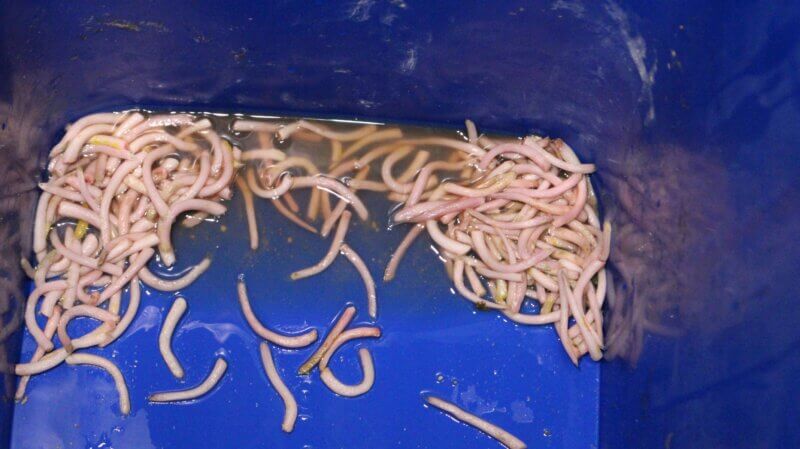
Stunning
Several stunning methods are legal in Australia, including electric shock (via head or whole-body stunning), a shot to the head with a captive-bolt gun, blunt-force trauma, and – the most common method – suffocation with carbon dioxide gas, which is used in about 90% of Australian abattoirs.
All stunning methods raise serious welfare concerns. Electrodes are sometimes improperly placed, leading to ineffective electro-stunning, and although whole-body electrocution is designed to trigger cardiac arrest – an extremely painful experience, as any human who has suffered one will attest – this is not guaranteed, meaning the pigs’ pain, fear, and panic may be prolonged. Blunt-force trauma and the use of captive-bolt guns rely on the skill and accuracy of the worker, and errors in placement – or, in the case of blunt-force trauma, force – can make both methods ineffective and more traumatic for the animals by rendering them severely injured but still very much conscious.
Gassing of pigs has recently been in the public spotlight – and with good reason. A 2023 Farm Transparency Project investigation into three of Victoria’s biggest abattoirs – Australian Food Group, Diamond Valley Pork, and Benalla Abattoir – revealed the horror that pigs experience during this legal and widely practised method. Video footage revealed the gasping and thrashing of terrified pigs, the pitch of their desperate squeals becoming increasingly high and sharp as they were lowered into the gas pits and engulfed by the chemical, which painfully acidifies in their delicate throats and noses and causes severe respiratory distress.
The investigation further documented that pigs were pushed into “gondolas” (the apparatus that lowers them into the chambers) on top of the bodies of pigs who had already been killed. Several pigs’ limbs were painfully trapped in the mechanism. The video also showed deeply distressed pigs who were still alive after they were tipped out of the gondola.
This method doesn’t result in a “quick stun” of the animals but rather a slow loss of consciousness. Gassing is so distressing that the RSPCA has found that most pigs would prefer to go without water for 72 hours – a severe hardship – than experience exposure to carbon dioxide.
There is no humane way to slaughter a living, feeling being. Every single method used in Victoria comes with extremely serious welfare concerns. Carbon dioxide gas use, currently the most prominent method, is clearly distressing for animals and should have no place moving forward.
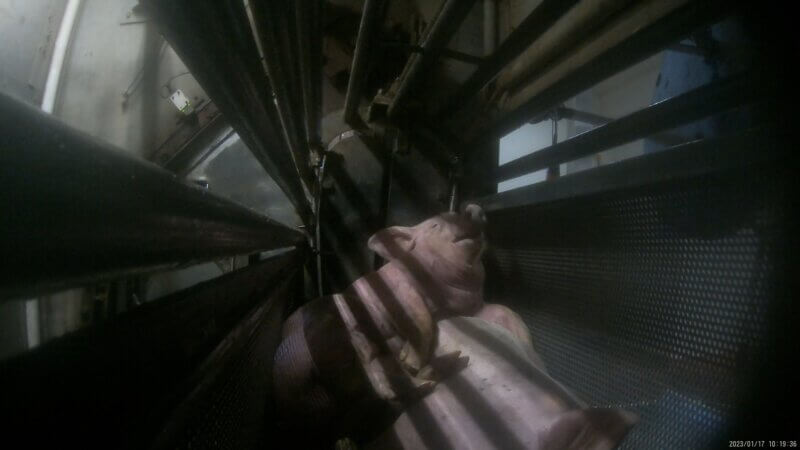
Speak Up for Pigs
When making a submission to the inquiry, explain in your own words why the industry should be shut down. In the interim, taking steps to improve welfare is the bare minimum that the industry do. Call for more space and enrichment for pigs, a ban on sow stalls and farrowing crates, and an end to routine mutilations and carbon dioxide gassing.
The best way to help pigs in Victoria is to go vegan. Rejecting the daily cruelty that occurs on farms and in slaughterhouses is as easy as making some simple and delicious changes when you prepare dinner. Order PETA’s free vegan starter kit for tips, recipes, and advice.
